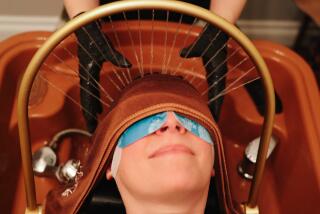Germany Seeks to Tighten Tap on Spas
- Share via
BAD DRIBURG, Germany — Gertrud Hoenen, a spry 85-year-old retiree, has been coming to this idyllic spa for years to relax in hot mud baths, limber up with exercise and enjoy massages.
It’s a luxury many of her countrymen can indulge in. The state picks up most of the tab for spa visits, something Germans consider a benefit to health.
The German ritual of “taking the waters” is like “a vacation, with something for your health thrown in,” Hoenen says.
That attitude has the federal government saying, enough. Determined to pare the huge costs of Germany’s welfare state, officials say a good target for pruning is a spa bill running to 15 billion marks a year--about $10 billion.
Germans are entitled to regular spa “Kuren,” or cures, including preventive visits and maternity treatments. Back pains, stomach problems, even the mere threat of stress-caused discomfort can be enough for a federally financed stay at one of the nation’s more than 300 spas.
Critics say some of the purported health benefits are not scientifically proven and patients often skip the treatments they are sent to take.
And government officials and health experts say doctors and the state health insurance system are approving too many questionable cures.
“People haven’t become sicker over the last few years,” says Heike Mader, spokeswoman for the Health Ministry. “Some have a demand attitude and think they are entitled to a cure every three years even when it’s not necessary. We want to prevent people from taking cheap vacations at government expense.”
So Chancellor Helmut Kohl, whose own “fasting cures” don’t seem to put much of a dent in his ample bulk, has taken aim at this potent symbol of German welfare benefits.
In future, the government plans to pay for cures only every four years and for a maximum of three weeks instead of four. Spa patrons will have to pay up to 25 marks ($17) a day out of their own pockets, more than double the current 12 marks. And two vacation days will be deducted for every week at a spa.
The change has drawn howls from the spa industry and from citizens for whom the cure is as German as coffee and cake on Sunday.
“If we have such a great achievement, why should only the rich be able to afford it?” said Georg Kohmescher, 59, in rehabilitation at Bad Driburg for eye-muscle paralysis.
Intended mainly to keep working people healthy and save disability benefits, state-financed cures became a social fixture as part of a 1956 law that established Germany’s tight social safety net.
For the many patrons without major ailments, a day at the spa might include a morning of mineral baths, a hearty meat-and-wine lunch, a walk in the Kurpark and an evening dance.
By the time the visit is over, the average German has run up a tab of $4,700.
Kohl’s plan to trim 20% off spa costs is part of $17 billion in federal spending cuts he wants to implement next year to rein in the budget deficit and revive the economy by lowering the tax burden.
Despite spa-industry protests, the cuts are expected to pass Parliament in September.
Famous spas like Baden-Baden have kept up a turn-of-the-century tradition as playgrounds of the rich, attracting home-grown yuppies and nouveau riche eastern Europeans.
But most of the industry’s 300,000 jobs still depend on government largess.
The spas agree that abuses must be fought. But they argue that the government is unfairly hitting chronically ill patients and that their rehabilitation clinics are cheaper and nicer than hospitals.
That’s the byword at the Bad Driburg baths, a collection of old half-timbered houses and neat modern clinics set in a leafy park with a deer enclosure and duck pond.
Overweight? Try the healing properties of the town’s government-approved mineral water at the taps in the “drinking hall,” along with gym exercises.
Recovering from bypass surgery? Cold-bath therapy developed by 19th century Bavarian priest Sebastian Kneipp could help.
“In no other country do so many people take cures,” says the weekly Die Zeit. “There’s a Kur for everyone and everything.”
More to Read
Sign up for Essential California
The most important California stories and recommendations in your inbox every morning.
You may occasionally receive promotional content from the Los Angeles Times.













